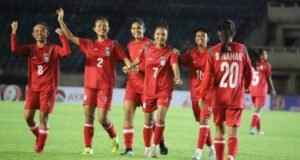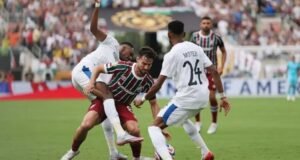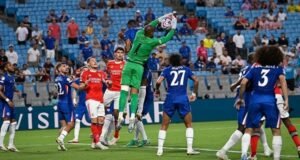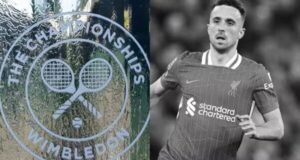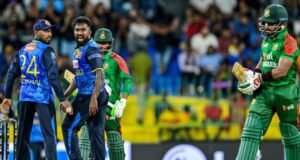
Emdad Rahman :
The Earl of Shrewsbury DL and The Lord Ouseley hosted a lunch reception in the Cholmondeley Rom and Terrace, House of Lords to celebrate the launch of the Fleet Street Sport and Media Group, an iconic group for an exciting new concept in sports media and consultancy.
After an introduction from the Earl, Lord Ouseley said: “It’s a sports venture that has an important role to play in the lives of many people and I wish the group success, especially as the services offered will benefit so many people who need help, guidance and advice.”
Former Arsenal, Manchester City player and Sunderland chairman Niall Quinn, Harry Harris (the award-winning sports journalist and author of 74 books), and former Sky news journalist, editor and producer Jem Maidment along with several others have joined forces to form Fleet Street Sport & Media Group in conjunction with several household names in the world of sport and media.
The aim of the group is to provide an all-inclusive offering in sports consultancy.
Former Republic of Ireland star Quinn, who is the chairman of Fleet Street Sport and Media Group spoke about retirement and life post football – an aspect of the game that often draws attention. He said: “Part of the support services we offer is that we concentrate on the wellbeing of the person and look at prevention as a cure. It’s very important to focus on the rest of one’s life before the end of one’s playing career. In that sense players can be prepared to deal with the challenges that lie ahead after they retire.
“We want to reduce the number of cases of depression, divorces, dark periods and bankruptcy. To better prepare for what lies ahead, we want the opportunity to nurture players and help them avoid potential pitfalls that are waiting after they retire from the game.
“What we see in the public domain from time to time is only the top of the iceberg. The real issues are hidden and are far more grim. We work with clubs, boards and agents and hope to offer our support to prevent such sad situations.”
Quinn read a passage from a book titled ‘Retired’ – What happens to footballers when the game’s up. It’s the first book by Irish stand-up comedian Alan Gernon. The Dundalk and Manchester Unitred fan said: “I had an idea to write this book when I thought about players around my age retiring. On average the football retirement age is around 35 and I asked myself what happens next? Most of the people I know don’t retire with bags of money and live happy ever after with millions in the bank.
“Although some become managers and pundits, we don’t know what happens to the majority. Transition from the game to ‘normal life’ is often very difficult and the cause of several problems – divorce, mental health and financial issues amongst other things.
Stephanie Moore MBE, the widow of the late Bobby Moore, the only man to lift the football World Cup for England, and the founder of the Bobby Moore Fund for Cancer Research UK applauded the launch of the group and the wider support it offers. Since the Bobby Moore Fund for Cancer Research UKwas set up in 1993 mortality rates have fallen 30% and over £22 million has been raised for research. She said: “There is a need to be involved earlier in footballer’s careers, although the simple matter of resources has to be taken into account, especially as someone needs to be allocated to look after footballers and their welfare.
“Paul Gascoigne is an example. He was ok until Terry Venables moved away and then he was clearly rudderless and really struggled. That could have all been avoided if he had a really good mentor. Lots of footballers live away from their families, friends and they’re trying to make it big whilst living in digs. I welcome any extra support. It’s really hard out there.”
Sky news pundit Paul Walsh won the league title with Liverpool and the FA Cup with Tottenham during a 17 year career with Charlton, Manchester, QPR, Luton and two stints at Portsmouth. He said: “I have bought my Dad along and he’s really excited – This is his very first time in the House of Lords and Parliament.”
Walsh, who won 5 senior caps under Sir Bobby Robson, was a member of the triumphant England team at the 1980 UEFA European Under-18 Championship in East Germany is not surprised by the emergence of Leicester City as a force in the Premier League: “Everyone says that I must have always rooted for Tottenham but at the end of the day Leicester have simply been fantastic all season. Leicester were simply the best team. They were great, exciting, and different, and each and every squad member has a great story behind how they got there.”
Jimmy Carter played with Teddy Sheringham, Tony Cascarino and Terry Hurlock at Millwall before high profile moves to Liverpool and Arsenal. The match day host and commercial executive at Millwall feels education is a must in supporting footballers during and after their playing career is over: “As a player you only focus on your tasks and delivering on the pitch and getting the right results for your team. It’s difficult to put the onus on clubs as players are not always in one place and move on to different clubs during their career. However, I do agree that education is important to prepare players on how to manage their lives during and after their career.”
1991 FA Cup winner David Howells made his Tottenham debut at 18 and scored in a 2-1 win over Sheffield Wednesday. The midfielder played 277 games for Spurs and scored 22 goals. Howells is supportive of what Fleet Street Sport and Media Group are trying to achieve: “It makes sense whichever way you look at it. Planning one’s life is always the best option. Saving for a rainy day and being prepared to being out of work are all processes which are part and parcel of our lives.
“It’s difficult after retirement, especially as it’s all you’ve done since playing football on the streets as a youngster and all of a sudden at 33 or 35 years of age you have a gap. So the next challenge is to find something that enriches and adds fulfilment to the next stage of your life.”
Former Swiss international and Tottenham, Celtic, Watford and Grasshoppers centre back Ramon Vega is grateful for the opportunities offered to him by football. In October 2015 Vega considered standing as a candidate for the FIFA Presidential race. He said: “I am the son of immigrants and I understand how difficult it is being out there on your own and how hard one has to work to make a success of their lives. The opportunities are out there but it takes a great deal of hard graft and commitment. All these footballers in this very room – each and every one had to work hard to make it on the pitch. Some would say that they had to work harder to make it off the pitch and their stories should inspire others who will follow.
“Remember, not everyone is rich, even though the modern day football pay is out of this world. Many don’t save, invest badly or give it away. Before they realise it their careers are over and they are struggling to pay basic bills.
“The question always is what one will do after retirement? What next? It’s scary. Some may have something saved, others may not have a cushion to fall back on and that’s difficult. There’s not a great deal of help so any mentoring, guidance and advice for players whilst they are playing would always be very useful in preparing them for life after their playing career ends. What Niall (Quinn) has spoken about is a great system of support.
“Thankfully I have had a successful business and football career and I’m enjoying life since retirement. I have developed a taste for football politics through my interest in the FIFA Presidential race it is something I would like to be more involved with in the future.
Guests attending the launch included former Arsenal vice chairman David Dein, Osvaldo Ardiles, Ricardo Villa and Martin Tyler.
 Weekly Bangla Mirror | Bangla Mirror, Bangladeshi news in UK, bangla mirror news
Weekly Bangla Mirror | Bangla Mirror, Bangladeshi news in UK, bangla mirror news


